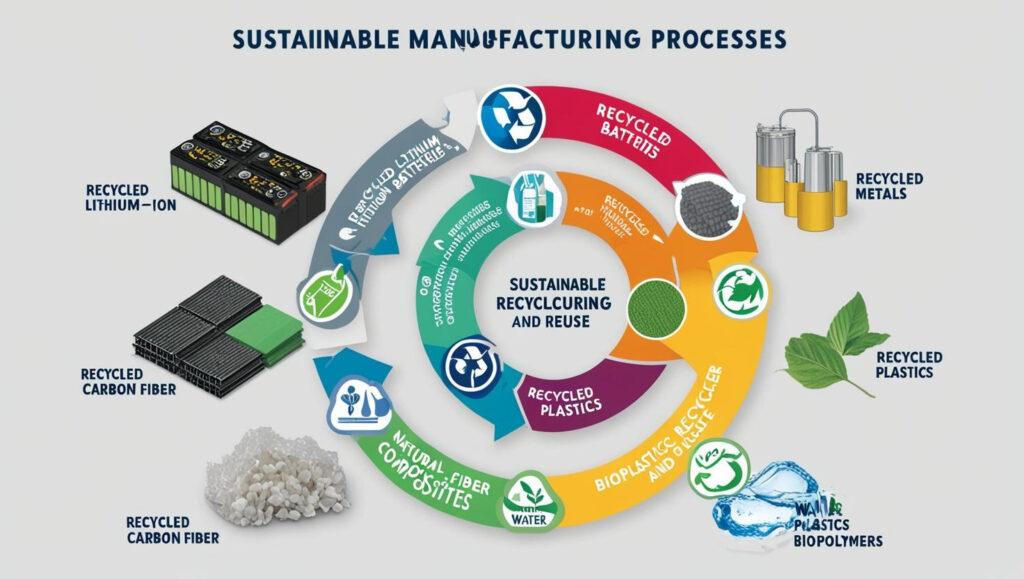The global sustainable manufacturing market is at the forefront of a transformative era, merging environmental responsibility with economic growth. Valued at USD 215.4 billion in 2024 and projected to reach USD 367.2 billion by 2029, the market is set to register a robust CAGR of 11.3% during the forecast period. This remarkable growth is fueled by a confluence of technological advancements, regulatory mandates, and shifting consumer preferences, all of which highlight the significance of sustainability in modern manufacturing.
Download PDF Brochure @ https://www.marketsandmarkets.com/pdfdownloadNew.asp?id=140349832

Key Trends Shaping Sustainable Manufacturing
1. Adoption of Recycled Materials
Manufacturers are increasingly integrating recycled materials into production processes, reducing their reliance on virgin resources. This shift not only minimizes environmental impact but also reduces production costs, enhancing profitability. Recycled plastics, metals, and other materials are being widely utilized, demonstrating the potential for a circular economy in manufacturing.
2. Biobased Innovations
The rise of biobased materials, such as biodegradable plastics and plant-based fibers, is another pivotal trend. These materials are derived from renewable sources, offering a sustainable alternative to traditional petroleum-based products. Their application spans diverse industries, including packaging, textiles, and automotive components, underscoring their versatility and market appeal.
3. Energy-Efficient Processes
Energy efficiency remains a cornerstone of sustainable manufacturing. Companies are leveraging technologies such as smart grids, energy management systems, and waste heat recovery to optimize energy use. By adopting energy-efficient practices, manufacturers not only lower operational costs but also contribute to global decarbonization efforts.
Opportunities in the Market
1. Green Hydrogen Revolution
Green hydrogen is emerging as a game-changer in sustainable manufacturing. Produced using renewable energy, green hydrogen offers a zero-emission alternative for powering industrial processes. Its adoption is particularly promising in hard-to-decarbonize sectors like heavy industry and transportation. Technological advancements in electrolyzers and declining costs of renewable energy are making green hydrogen more accessible, paving the way for widespread adoption.
2. Advanced Recycling Technologies
Innovations in recycling technologies are creating new opportunities for manufacturers. Advanced techniques, such as chemical recycling and molecular-level sorting, enable the efficient recovery of materials that were previously difficult to recycle. This progress supports the integration of high-quality recycled inputs into manufacturing processes.
3. Corporate Social Responsibility (CSR) Initiatives
Consumer awareness of environmental issues is compelling companies to adopt sustainable practices. Corporate social responsibility (CSR) initiatives, aimed at reducing carbon footprints and improving supply chain transparency, are becoming critical for maintaining competitive advantage. Organizations that embrace sustainability are better positioned to attract eco-conscious consumers and investors.
Regional Insights: Asia Pacific Leading the Charge
The Asia-Pacific region holds the largest share of the sustainable manufacturing market, driven by its robust industrial base and strong governmental support for green initiatives. Countries like China, Japan, and South Korea are investing heavily in renewable energy and green technologies to support sustainable manufacturing. Ambitious targets for carbon emission reductions and energy efficiency in nations such as India and Australia further underscore the region’s leadership in this domain.
Challenges and the Road Ahead
Despite the promising trends, challenges such as high initial investment costs, limited access to green technologies in developing regions, and regulatory hurdles persist. Addressing these barriers requires collaboration among governments, industry players, and technology providers.
Looking ahead, the sustainable manufacturing market offers immense potential for growth and innovation. With continued advancements in materials, processes, and technologies, the industry is well-positioned to redefine global manufacturing practices. Businesses that invest in sustainability today are not only securing their future competitiveness but also contributing to a healthier, more sustainable planet.